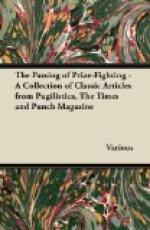Viscount VALENTIA has gone to the Lords, and the Commons will henceforth miss the elegant and well-groomed figure which lent distinction to a Treasury Bench not in these days too careful of the Graces. Happily Oxford City has found another distinguished man to succeed him. Mr. J.A.R. MARRIOTT may indeed be said to have obtained a Parliamentary reputation even before, strictly speaking, he was a Member. Usually the taking of the oath is a private affair between the neophyte and the Clerk, and the House hears nothing more than a confused murmur before the ceremony is concluded by the new Member kissing the Book or—more often in these days—adopting the Scottish fashion of holding up the right hand. Oxford’s elect would have none of this. Like the Highland chieftain, “she just stude in the middle of ta fluir and swoor at lairge.” Not since Mr. BRADLAUGH insisted upon administering the oath to himself has the House been so much stirred; even Members loitering in the Lobby could almost have heard the ringing tones in which Mr. MARRIOTT proclaimed his allegiance to our Sovereign Lord, KING GEORGE THE FIFTH.
Tuesday, April 3rd.—Mr. KING really displays a good deal of ingenuity in his endeavours to get men out of the Army. His latest notion is that all Commanding Officers at home should be ordered to give leave to those men who have gardens so that they may return to cultivate them. There would, no doubt, be a remarkable development of horticultural enthusiasm among our home forces if the War Office were to smile upon the idea; but, though fully alive to the value of food-production, the UNDER-SECRETARY was unable to assent to this wide extension of “agricultural furlough.”
A request by the Press Bureau that newspapers would submit for its approval any articles dealing with disputes in the coal-trade gave umbrage to several Members, who saw in it an attempt by the Government to fetter public criticism. Mr. BRACE mildly explained that the object was only to prevent the appearance of inaccurate statements likely to cause friction in an inflammable trade. When Mr. KING still protested, Mr. BRACE again showed that his velvet paw conceals a very serviceable weapon. “Surely the Honourable Member does not believe that inaccurate statements can ever be helpful.” Then there was silence.
Mr. BONAR LAW stoutly denied that the National Service scheme was a failure, but admitted that the Cabinet was looking into it with a view to its improvement. Up to the present some 220,000 men have volunteered, but as about half of these are already engaged on work of national importance Mr. NEVILLE CHAMBERLAIN is still a long way short of his hoped-for half-a-million ready, like the British Army, to go anywhere and do anything.
A telegram from the British Ambassador at Washington, stating that President WILSON’S War-speech had been very well received, and that Congress was expected to take his advice, gave great satisfaction. As the MINISTER FOR AGRICULTURE observed, “The outlook for early potatoes may be doubtful, but our SPRING-RICE promises excellently.”




